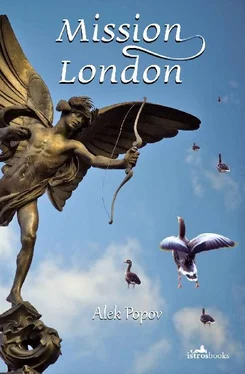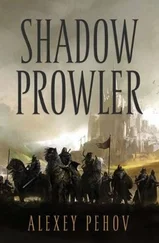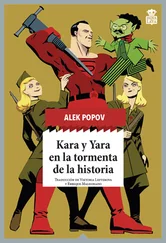They inched down the stairs and across the basement, then came out into the corridor, turned left and found themselves directly in front of the kitchen door. Here the cook stopped and started listening nervously.
“What’s wrong?” asked Chavdar anxiously.
“I thought I heard something inside,” Kosta whispered and continued to listen.
“Coward! You’re going to fill your pants!”
The cook curled his lip contemptuously, opened the door and turned on the light.
Batushka whistled in surprise. The kitchen was vast; one might assume that they were cooking for entire regiments down there. Which incidentally was not very far from the truth, especially in the not so distant totalitarian past when the life in the Embassy had been flying high. Now, social life was dribbling, squeezed drop by drop through the needle’s eye of the market economy, and stagnation had settled in the kitchen. Some of the crockery had been stolen. The basins were covered with mould. The tiles around them were yellowish and cracked. Kosta drifted like a phantom between the cold ovens and the empty fridges. He rarely had to cook now; the only things left to do were the sandwiches and various nibbles, made from convenience products. From time to time he prepared the traditional Bulgarian pastry called ‘banitsa’, which was received by the guests with exclamations of ‘Oh, banitsa!’ A mixture of grief, nostalgia and hope still hid in his heart for a more substantial order, like a saddle of lamb, for example. Alas, the era of saddles was long gone, buried beneath a mountain of gnawed bones. A piece of sausage and a slice of gherkin speared with a tooth pick was the only thing he could hope for now. Without blinking, Kosta emptied the contents of the bag onto the long metal table. Around ten well-fed ducks fell out of it. Their necks were broken, twisted without pity. He noticed, on the leg of each one of them, a small silver ring.
“Wow, where did you catch these?”
“Nearby,” both men chuckled.
One of the birds flapped its wing haplessly; apparently, not completely finished off. Kosta quickly put an end to its suffering. He was now feeling more at home and that reassured him. He took out two whitish aprons and threw them to his accomplices. After a moment of hesitation, they put them on and moved closer to him like apprentices. The cook gave each one of them a big knife and pointed at the stove where a big pot of water had been simmering for some hours.
“You know what to do now?” he asked.
Both men rolled up their sleeves and started.
“You have four hours,” he warned them.
He went back to the duty room and checked his watch. He had been absent for no more than twenty minutes. He sat behind the desk, took out the logbook and signed in the column ‘on duty’, because he expected to forget about it in the morning. In the next column-‘comments’ — he wrote, ‘nothing unusual’. He then closed the logbook and put it back in the drawer.
Night-watch duty was awful, and, on top of that, long. From the cook to the consul — no escape. Everyone was equal as far as that sacred duty was concerned. Every day, around six in the evening, one could see the person on duty trot to the Embassy with his toilet bag, lunch box and some bed sheets. The humiliation recurred three or four times a month, according to the rota. They had to stay in the duty room like spiders in their web until the morning: watch television, answer the phone, open the door if necessary, drink, eat, and sleep. They were guarding the state’s dream. Some even shagged, but the cook was not one of them.
He flumped his body in front of the television, slipped off his shoes and opened a can of beer. Under other circumstances he would have sprawled on the bed and fallen asleep immediately, but now he had to watch. He was alert and quite often looked at the glaring blue screen, hanging on the opposite door. It seemed to him somebody was watching him although the situation was actually the opposite.
The air stank of socks.
He dragged the remote out from beneath his bottom and flicked to the pornography channel, decoded for the people’s use, courtesy of an able Bulgarian student. He gaped at it a bit, but could not concentrate. He thought only of the ducks. Fat birds! Wonder, where they took them from…? If the Chinese don’t buy them, as Chavdar and Batushka swore, we’re going to be eating duck into the next year. For fuck’s sake! Hell of a lot of birds that!
The electronic bleep of the telephone jolted him out of his dream. He picked it up and sleepily said, “Yeah.”
“Bulgarian Embassy?” a distant little voice sang.
“Aha.”
“Excuse me, could you tell me if I need a visa to visit Bulgaria?”
A short pause followed. The cook’s heart lurched into revolt. He hardly spoke a word of English, but the word ‘visa’ was clear enough to pour fat on the fire.
“You cunt!” he hissed maliciously in Bulgarian “What kind of visa are you looking for at this hour in the morning, go and fuck yourself, otherwise I’ll do it for you!!!”
From the other end came a burst of mocking laughter.
“Dozy Pastry! Your old mother!” Chavdar Tolomanov quickly changed his intonation “Stupid Pastry!” He was phoning on his mobile from the kitchen.
“Is that you? Are you taking the piss?” gasped the cook, after he’d calmed down a little. “Are you ready?”
“What do you think?”
“Coming,” he answered shortly.
It was half-four in the morning.
The kitchen was like an abattoir. Chavdar and Batushka were furiously scrubbing under the taps — their hands were sticky with blood, which had seeped deep under their fingernails. The freezer was stuffed with birds. The feathers and the offal had been stuffed back into the bags. Kosta looked underneath the tables and frowned; he would have to mop the floor. On the table top lay a plate, full of silver rings.
“Let us scram the fucking out!” said Batushka wiping his wet hands against the wall.
Something clicked in the cook’s head.
“And the money? Where’s the money?”
“Aaa! Sorry I forgot,” Batushka raised his hands.
“What do you mean — you forgot?!” hissed the cook. “I thought we agreed. 100 pounds, cash, up front.”
“Tomorning, Zavtra,” mumbled Batushka with some annoyance.
“No tomorrow, no zavtra, now!” shouted Kosta.
“Easy, my man,” Chavdar decided to intervene. “Zavtra says the man, That means tomorrow. We’re doing business for millions here, we’re hardly going to cheat you for spare change. Isn’t that right, Batushka?”
“Right, that’s right,” said Batushka scornfully.
The cooked goggled like a zombie. They were pulling the same number on him for the second time. He opened his mouth to speak, but felt he was going to enter the same familiar script. He waved them off and spat on the floor.
Varadin popped up into the Embassy just after nine. He had met Kosta in the street, coming back from his night-shift, carrying a nylon bag in one hand and with an anxious sticky look on his face. This encounter curdled the Ambassador’s mood instantly; as if a bogie had unexpectedly dropped into his milk that morning. They greeted each other dryly.
Behind the reception window another low-spirited employee faced him; she was meditating over an old Bulgarian newspaper. He crossed the official entrance hall and tried to go through the door, which led to the Embassy interior. It turned out he had forgotten its security code. He tried in vain for several minutes. In the end, the Consul appeared and without any sign of noticing his troubles (although he was laughing inside!), carefully greeted him and keyed in the code. Varadin rushed to slip into the lift and pressed the button for the second floor. Leaving the lift, he looked to the right, where he had noticed a particularly dirty spot on the carpet the previous day, and noted with pleasure that it had been cleaned.
Читать дальше












